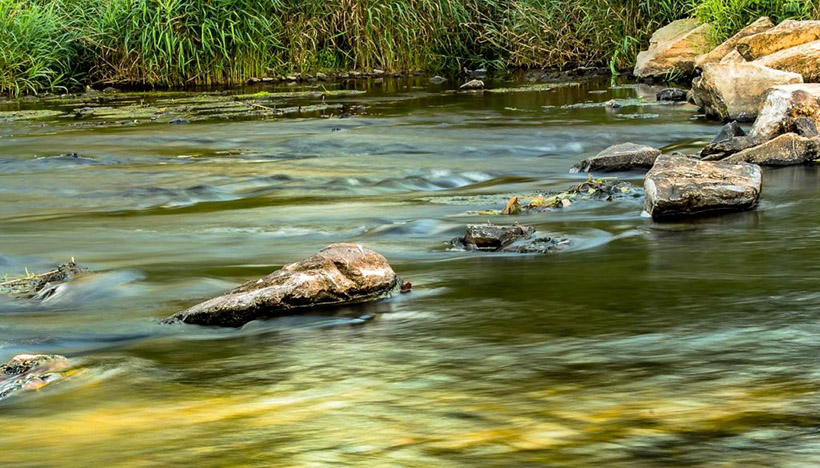Publisher's note: This post appears here courtesy of the Carolina Journal, and written by Donald van der Vaart.

When President Trump
speaks to the American Farm Bureau Federation's annual convention Sunday, I'll be listening for next steps in his plan to free North Carolina farmers from the devastating overreach of Obama administration rules that expanded the definition of private land that can be regulated under the federal Clean Water Act.
Under President Obama's redefinition, much more of North Carolina, and virtually all of our state east of Interstate 95, would have been designated as Waters of the United States. Land that is designated as wetlands is subject to land-use restrictions that are intended to protect streams and rivers. However, the overly broad definition composed by Obama's bureaucrats in Washington would have done nothing to protect water quality. The rule would have had a disproportionate impact on our farmers by reducing their land values and forcing them through
lengthy permitting red tape before making changes in their land's use. The process has been the subject of much criticism, with horror stories of the process lasting years.
Obama's rule was also illegal, according to U.S. Supreme Court rulings. Trump's Environmental Protection Agency understood its legal obligations and knew the grave threat Obama's rule posed not only to individual farmers, but to North Carolina's top economic sector. The Trump administration immediately set to work on first repealing the rule, which it did last year, and reforming WOTUS according to the Supreme Court's rulings on the limits of federal power. The less restrictive WOTUS rule is expected soon from the EPA. It's these changes I hope to hear about Sunday.
At the core of the issue is the extent of the authority of the federal government. The Clean Water Act does not regulate waters of the United States based on the likelihood of their contributing pollution to actual navigable waters. It regulates anything that is navigable. As EPA legal experts have explained, even if the CWA targeted pollution, implementation would still be limited by the authority granted to the federal government by the states in the U.S. Constitution.
This means the question of what should be included as Waters of the United States is not a scientific inquiry, but a legal one. It is one the U.S. Supreme Court has attempted to convey to the EPA in past decisions.
States are free to go beyond WOTUS - and North Carolina already does - to regulate whatever waters or land it believes necessary. States have far better knowledge of what lands need to be regulated than bureaucrats in Washington. Without amending the CWA consistent with the Constitution, however, the EPA cannot and should not attempt to expand its control of private property.
Based on history, it's a good bet that Gov. Roy Cooper's administration will challenge Trump's reforms to WOTUS. During the Pat McCrory administration, then Attorney General Cooper did not represent North Carolina in lawsuits filed against the Obama administration's expanded WOTUS, even though the majority of states (29) had filed lawsuits. To protect North Carolina's rights, McCrory
moved to challenge the WOTUS expansion despite Cooper's refusal to represent the state. McCrory implemented a state constitutional provision allowing him to appoint Department of Environmental Quality General Counsel Sam Hayes as special counsel to represent North Carolina in multiple lawsuits. This effort was rewarded when the Obama-era rule was stayed by a federal appeals court. By issuing the stay, the court recognized the significant harm WOTUS would cause and the legal frailty of the rule.
While the lawyers fought in court, farmers fought back, as well. They knew the rule would significantly impact property values immediately by restricting land use. Farmers were part of a larger coalition that formed when it became clear the initial process used to develop the expanded WOTUS was cloaked in secrecy. While developing the maps that showed the expanded jurisdiction under its proposed rule, Obama's EPA refused to consult with state agencies that would implement the new rule. Pressure from Congress compelled EPA to share the maps.
In a letter to EPA Administrator Gina McCarthy, Rep. Lamar Smith, R-Texas, chairman of the House Science Committee
declared,
"Given the astonishing picture they paint, I understand the EPA's desire to minimize the importance of these maps. But EPA's posturing cannot explain away the alarming content of these documents."
The Senate Committee on Agriculture, Nutrition, and Forestry, which included North Carolina's Republican Sen. Thom Tillis and North Dakota's Democratic Sen. Heidi Heitkamp, held hearings on the rule. In the meantime, the Obama administration was lobbying for the rule and was
cited by the Government Accountability Office for violating the law. A bipartisan resolution repealing the rule was passed by Congress
but vetoed by Obama, who also ignored the violations by his agency.
Thankfully, things are about to change. The EPA is expected to publish the final rule this month. I expect the reformed WOTUS will be challenged, but the efforts by so many has already illustrated the success of cooperation between states and the federal government in ensuring our Constitution and our laws are faithfully executed.
NOTE: These comments are the opinion of the author and do not necessarily express the position of the John Locke Foundation.
Donald van der Vaart is a senior fellow at the John Locke Foundation. Formerly, he was secretary of the N.C. Department of Environmental Quality and the state's energy policy adviser.
























